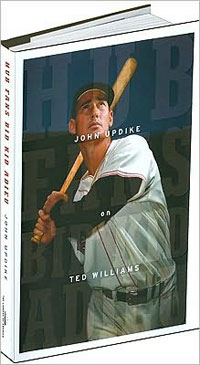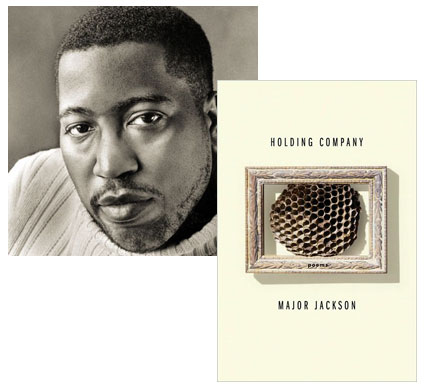Read This: Hub Fans Bid Kid Adieu
 Fifty years ago, Ted Williams played his last major league baseball game; “on an impulse,” John Updike would recall years later, “I bought in for a few dollars… and the park was two-thirds empty. I was moved to write about the events of that game, in part because his departure, taking with it the heart of Boston baseball, had been so meagerly witnessed.” The essay Updike wrote, “Hub Fans Bid Kid Adieu,” was published in The New Yorker a month later, and has been widely praised not only as one of the author’s best nonfiction works, but as one of the greatest pieces on baseball by any author. Earlier this year, it was republished in a commemorative Library of America edition, which is itself a fine bit of publishing. (Be sure to take off the Chip Kidd-designed dust jacket, even if only for a moment, to look upon the photograph reproduced on the book’s casing.)
Fifty years ago, Ted Williams played his last major league baseball game; “on an impulse,” John Updike would recall years later, “I bought in for a few dollars… and the park was two-thirds empty. I was moved to write about the events of that game, in part because his departure, taking with it the heart of Boston baseball, had been so meagerly witnessed.” The essay Updike wrote, “Hub Fans Bid Kid Adieu,” was published in The New Yorker a month later, and has been widely praised not only as one of the author’s best nonfiction works, but as one of the greatest pieces on baseball by any author. Earlier this year, it was republished in a commemorative Library of America edition, which is itself a fine bit of publishing. (Be sure to take off the Chip Kidd-designed dust jacket, even if only for a moment, to look upon the photograph reproduced on the book’s casing.)
It’s not a long essay, but Updike managed to fit a lot of tribute into it—recounting not only Williams’ performance in his final appearance at Fenway Park, and the reactions of Updike’s fellow fans, but also the exemplary features of the slugger’s long career in Boston, as well as his contentious relationship with the local press. It is a partisan account, but not belligerent in its advocacy, and though a bit florid in spots (“After a prime so hassled and hobbled, Williams was granted by the relenting fates a golden twilight”), it holds up as one of the most genuine expressions of fandom I’ve had the good fortune to read.
28 September 2010 | read this |
Major Jackson, “Roof of the World”

I live on the roof of the world among the aerial
simulacra of Things, among the faded: old tennis shoes,
vanished baseballs, heartbreak gritted with dirt. My mind
flickers like lightning in a cloud. I’m networked
beholding electric wires and church spires.
I lean forward and peer at the suffering below—
Sartre said: man is condemned to be free.
I believe in the dead who claim to believe in me—
says, too, the missing and forgotten. Day darkens
on. I hear our prayers rising. I sing to you, now.
The poems in Holding Company, the third collection from Major Jackson, share the formal bond of a ten-line structure—because, he told Identity Theory, “I wanted to teach myself how to create an exalted utterance in a poem, how to create something that was emotionally heartrending, that did not need a lot of scaffolding. I wanted to go in a new direction and allow that compression to sing the poem’s themes louder, sing emotive declarations by shrinking it further.” Sometimes there are other interesting connections between the poems; the last line of “Roof of the World,” for example, will turn up again in “Forecast” (from Poetry Out Loud), and another line from that poem finds its way into “White Power.”
Other poems in Holding Company include “Here the Sea,” “At the Club,” and “Maithuna” (all from Salt Magazine) and three other poems that inspired short animated films: “Leave It All Up to Me,” “Zucchini,” and “Migration.”
27 September 2010 | poetry |

 Our Endless and Proper Work is my new book with Belt Publishing about starting (and sticking to) a productive writing practice.
Our Endless and Proper Work is my new book with Belt Publishing about starting (and sticking to) a productive writing practice. 
